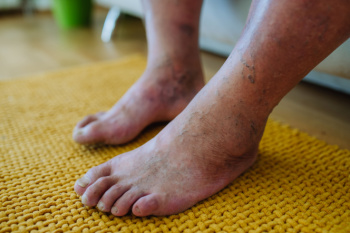
Plantar fasciitis involves inflammation of the plantar fascia, a thick band of tissue that connects the heel to the toes. It often results in sharp heel pain, especially with the first steps in the morning or after long periods of rest. Causes include overuse, improper footwear, or high-impact activities. Risk factors include flat feet, obesity, and prolonged standing. A podiatrist can accurately diagnose the condition, recommend custom orthotics, suggest stretching exercises, and offer advanced treatment to reduce pain and promote healing. If you are struggling with persistent heel pain or discomfort when walking, it is strongly suggested that you consult a podiatrist for an expert evaluation and care, tailored to restore your comfort and foot function.
Plantar fasciitis is a common foot condition that is often caused by a strain injury. If you are experiencing heel pain or symptoms of plantar fasciitis, contact Donovan Gowdie, DPM from The Foot & Ankle Treatment Center. Our doctor can provide the care you need to keep you pain-free and on your feet.
What Is Plantar Fasciitis?
Plantar fasciitis is one of the most common causes of heel pain. The plantar fascia is a ligament that connects your heel to the front of your foot. When this ligament becomes inflamed, plantar fasciitis is the result. If you have plantar fasciitis you will have a stabbing pain that usually occurs with your first steps in the morning. As the day progresses and you walk around more, this pain will start to disappear, but it will return after long periods of standing or sitting.
What Causes Plantar Fasciitis?
- Excessive running
- Having high arches in your feet
- Other foot issues such as flat feet
- Pregnancy (due to the sudden weight gain)
- Being on your feet very often
There are some risk factors that may make you more likely to develop plantar fasciitis compared to others. The condition most commonly affects adults between the ages of 40 and 60. It also tends to affect people who are obese because the extra pounds result in extra stress being placed on the plantar fascia.
Prevention
- Take good care of your feet – Wear shoes that have good arch support and heel cushioning.
- Maintain a healthy weight
- If you are a runner, alternate running with other sports that won’t cause heel pain
There are a variety of treatment options available for plantar fasciitis along with the pain that accompanies it. Additionally, physical therapy is a very important component in the treatment process. It is important that you meet with your podiatrist to determine which treatment option is best for you.
If you have any questions, please feel free to contact our office located in Watkinsville, GA . We offer the newest diagnostic and treatment technologies for all your foot care needs.

For individuals living with diabetes, taking proper care of the feet is vital to avoid serious complications. Research shows that people who believe in their ability to manage their health are more likely to perform regular foot care tasks. This includes checking the feet daily, keeping them clean and dry, wearing protective footwear, and seeking help when changes occur. When a person feels confident in their skills and knowledge, they are more likely to stay consistent with these routines. On the other hand, low confidence may lead to neglect or delay in care, increasing the risk of ulcers, infections, or long-term damage. Encouragement, education, and support can help build confidence and improve outcomes over time. If you are managing diabetes and need help developing a foot care routine, it is suggested that you are under the care of a podiatrist who can help you with this serious condition.
Diabetic foot care is important in preventing foot ailments such as ulcers. If you are suffering from diabetes or have any other concerns about your feet, contact Donovan Gowdie, DPM from The Foot & Ankle Treatment Center. Our doctor can provide the care you need to keep you pain-free and on your feet.
Diabetic Foot Care
Diabetes affects millions of people every year. The condition can damage blood vessels in many parts of the body, especially the feet. Because of this, taking care of your feet is essential if you have diabetes, and having a podiatrist help monitor your foot health is highly recommended.
The Importance of Caring for Your Feet
- Routinely inspect your feet for bruises or sores.
- Wear socks that fit your feet comfortably.
- Wear comfortable shoes that provide adequate support.
Patients with diabetes should have their doctor monitor their blood levels, as blood sugar levels play such a huge role in diabetic care. Monitoring these levels on a regular basis is highly advised.
It is always best to inform your healthcare professional of any concerns you may have regarding your feet, especially for diabetic patients. Early treatment and routine foot examinations are keys to maintaining proper health, especially because severe complications can arise if proper treatment is not applied.
If you have any questions please feel free to contact our office located in Watkinsville, GA . We offer the newest diagnostic and treatment technologies for all your foot and ankle needs.

Ingrown toenails occur when the edge of the toenail grows into the surrounding skin, leading to pain, swelling, and sometimes infection. Common causes include improper nail trimming and cutting nails too short or rounded. Tight-fitting shoes, injury, or genetic predisposition are other factors. Symptoms typically begin with redness, tenderness, and swelling along the nail edge. As the condition progresses, the area may become warm, painful, and drain pus if infected. It may be difficult to wear shoes or walk comfortably. A podiatrist can diagnose an ingrown toenail through a physical exam. Treatment depends on the severity and may include soaking, proper trimming, and antibiotic ointments. In more advanced cases, a minor procedure, called nail avulsion, may be performed to remove part or all of the affected nail. This helps relieve pain and prevent recurrence. If you are dealing with a painful ingrown toenail, it is suggested that you make an appointment with a podiatrist for evaluation and treatment.
Ingrown toenails may initially present themselves as a minor discomfort, but they may progress into an infection in the skin without proper treatment. For more information about ingrown toenails, contact Donovan Gowdie, DPM of The Foot & Ankle Treatment Center. Our doctor can provide the care you need to keep you pain-free and on your feet.
Ingrown Toenails
Ingrown toenails are caused when the corner or side of a toenail grows into the soft flesh surrounding it. They often result in redness, swelling, pain, and in some cases, infection. This condition typically affects the big toe and may recur if it is not treated properly.
Causes
- Improper toenail trimming
- Genetics
- Improper shoe fitting
- Injury from pedicures or nail picking
- Abnormal gait
- Poor hygiene
You are more likely to develop an ingrown toenail if you are obese, have diabetes, arthritis, or have any fungal infection in your nails. Additionally, people who have foot or toe deformities are at a higher risk of developing an ingrown toenail.
Symptoms
Some symptoms of ingrown toenails are redness, swelling, and pain. In rare cases, there may be a yellowish drainage coming from the nail.
Treatment
Ignoring an ingrown toenail can have serious complications. Infections of the nail border can progress to a deeper soft-tissue infection, which can then turn into a bone infection. You should always speak with your podiatrist if you suspect you have an ingrown toenail, especially if you have diabetes or poor circulation.
If you have any questions, please feel free to contact our office located in Watkinsville, GA . We offer the newest diagnostic and treatment technologies for all your foot care needs.

